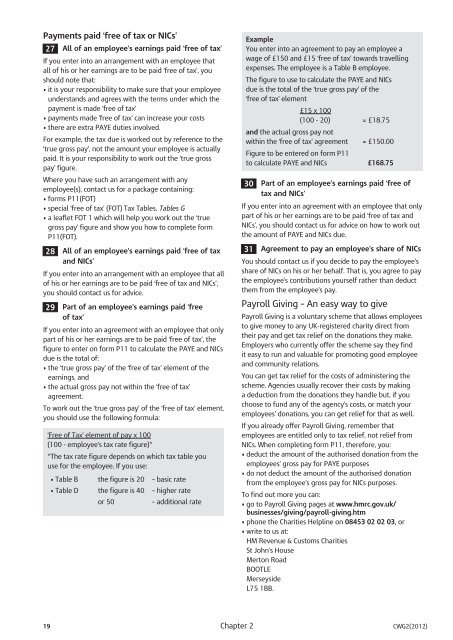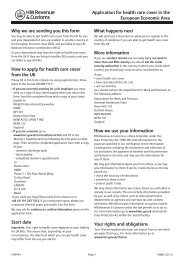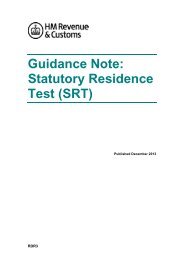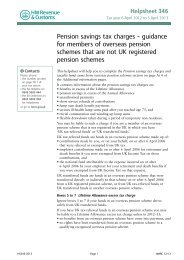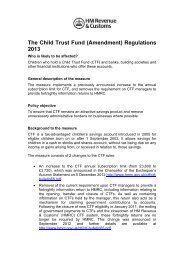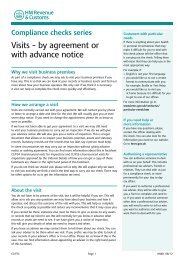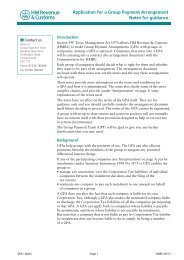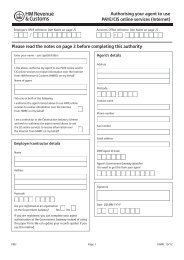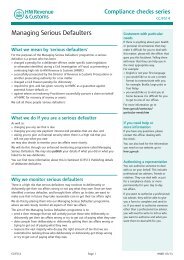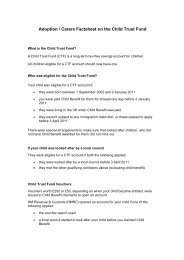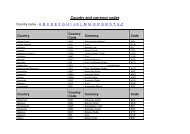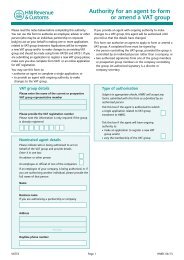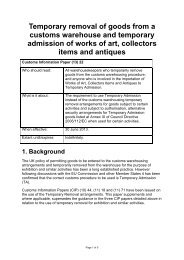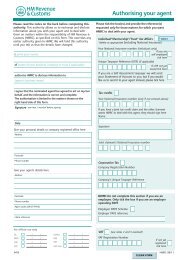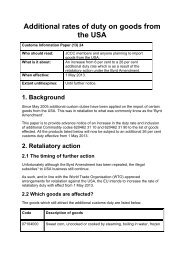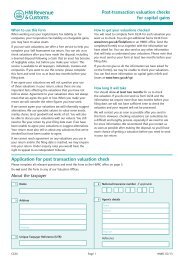Employer Further Guide to PAYE and NICs - HM Revenue & Customs
Employer Further Guide to PAYE and NICs - HM Revenue & Customs
Employer Further Guide to PAYE and NICs - HM Revenue & Customs
Create successful ePaper yourself
Turn your PDF publications into a flip-book with our unique Google optimized e-Paper software.
Payments paid ‘free of tax or <strong>NICs</strong>’<br />
27 All of an employee’s earnings paid ‘free of tax’<br />
If you enter in<strong>to</strong> an arrangement with an employee that<br />
all of his or her earnings are <strong>to</strong> be paid ‘free of tax’, you<br />
should note that:<br />
• it is your responsibility <strong>to</strong> make sure that your employee<br />
underst<strong>and</strong>s <strong>and</strong> agrees with the terms under which the<br />
payment is made 'free of tax’<br />
• payments made 'free of tax’ can increase your costs<br />
• there are extra <strong>PAYE</strong> duties involved.<br />
For example, the tax due is worked out by reference <strong>to</strong> the<br />
‘true gross pay’, not the amount your employee is actually<br />
paid. It is your responsibility <strong>to</strong> work out the ‘true gross<br />
pay’ figure.<br />
Where you have such an arrangement with any<br />
employee(s), contact us for a package containing:<br />
• forms P11(FOT)<br />
• special ‘free of tax’ (FOT) Tax Tables, Tables G<br />
• a leaflet FOT 1 which will help you work out the ‘true<br />
gross pay’ figure <strong>and</strong> show you how <strong>to</strong> complete form<br />
P11(FOT).<br />
28 All of an employee’s earnings paid ‘free of tax<br />
<strong>and</strong> <strong>NICs</strong>’<br />
If you enter in<strong>to</strong> an arrangement with an employee that all<br />
of his or her earnings are <strong>to</strong> be paid ‘free of tax <strong>and</strong> <strong>NICs</strong>’,<br />
you should contact us for advice.<br />
29 Part of an employee’s earnings paid ‘free<br />
of tax’<br />
If you enter in<strong>to</strong> an agreement with an employee that only<br />
part of his or her earnings are <strong>to</strong> be paid ‘free of tax’, the<br />
figure <strong>to</strong> enter on form P11 <strong>to</strong> calculate the <strong>PAYE</strong> <strong>and</strong> <strong>NICs</strong><br />
due is the <strong>to</strong>tal of:<br />
• the ‘true gross pay’ of the ‘free of tax’ element of the<br />
earnings, <strong>and</strong><br />
• the actual gross pay not within the ‘free of tax’<br />
agreement.<br />
To work out the ‘true gross pay’ of the ‘free of tax’ element,<br />
you should use the following formula:<br />
‘Free of Tax’ element of pay x 100<br />
(100 - employee’s tax rate figure)*<br />
*The tax rate figure depends on which tax table you<br />
use for the employee. If you use:<br />
• Table B the figure is 20 – basic rate<br />
• Table D the figure is 40 – higher rate<br />
or 50 – additional rate<br />
Example<br />
You enter in<strong>to</strong> an agreement <strong>to</strong> pay an employee a<br />
wage of £150 <strong>and</strong> £15 ‘free of tax’ <strong>to</strong>wards travelling<br />
expenses. The employee is a Table B employee.<br />
The figure <strong>to</strong> use <strong>to</strong> calculate the <strong>PAYE</strong> <strong>and</strong> <strong>NICs</strong><br />
due is the <strong>to</strong>tal of the ‘true gross pay’ of the<br />
‘free of tax’ element<br />
£15 x 100<br />
(100 - 20) = £18.75<br />
<strong>and</strong> the actual gross pay not<br />
within the ‘free of tax’ agreement = £150.00<br />
Figure <strong>to</strong> be entered on form P11<br />
<strong>to</strong> calculate <strong>PAYE</strong> <strong>and</strong> <strong>NICs</strong> £168.75<br />
30 Part of an employee’s earnings paid ‘free of<br />
tax <strong>and</strong> <strong>NICs</strong>’<br />
If you enter in<strong>to</strong> an agreement with an employee that only<br />
part of his or her earnings are <strong>to</strong> be paid ‘free of tax <strong>and</strong><br />
<strong>NICs</strong>’, you should contact us for advice on how <strong>to</strong> work out<br />
the amount of <strong>PAYE</strong> <strong>and</strong> <strong>NICs</strong> due.<br />
31 Agreement <strong>to</strong> pay an employee’s share of <strong>NICs</strong><br />
You should contact us if you decide <strong>to</strong> pay the employee’s<br />
share of <strong>NICs</strong> on his or her behalf. That is, you agree <strong>to</strong> pay<br />
the employee’s contributions yourself rather than deduct<br />
them from the employee’s pay.<br />
Payroll Giving – An easy way <strong>to</strong> give<br />
Payroll Giving is a voluntary scheme that allows employees<br />
<strong>to</strong> give money <strong>to</strong> any UK-registered charity direct from<br />
their pay <strong>and</strong> get tax relief on the donations they make.<br />
<strong>Employer</strong>s who currently offer the scheme say they find<br />
it easy <strong>to</strong> run <strong>and</strong> valuable for promoting good employee<br />
<strong>and</strong> community relations.<br />
You can get tax relief for the costs of administering the<br />
scheme. Agencies usually recover their costs by making<br />
a deduction from the donations they h<strong>and</strong>le but, if you<br />
choose <strong>to</strong> fund any of the agency’s costs, or match your<br />
employees’ donations, you can get relief for that as well.<br />
If you already offer Payroll Giving, remember that<br />
employees are entitled only <strong>to</strong> tax relief, not relief from<br />
<strong>NICs</strong>. When completing form P11, therefore, you:<br />
• deduct the amount of the authorised donation from the<br />
employees’ gross pay for <strong>PAYE</strong> purposes<br />
• do not deduct the amount of the authorised donation<br />
from the employee’s gross pay for <strong>NICs</strong> purposes.<br />
To find out more you can:<br />
• go <strong>to</strong> Payroll Giving pages at www.hmrc.gov.uk/<br />
businesses/giving/payroll-giving.htm<br />
• phone the Charities Helpline on 08453 02 02 03, or<br />
• write <strong>to</strong> us at:<br />
<strong>HM</strong> <strong>Revenue</strong> & Cus<strong>to</strong>ms Charities<br />
St John’s House<br />
Mer<strong>to</strong>n Road<br />
BOOTLE<br />
Merseyside<br />
L75 1BB.<br />
19 Chapter 2 CWG2(2012)


